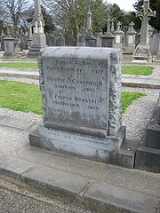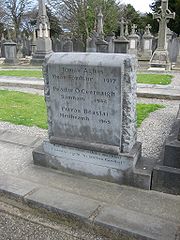
Piaras Béaslaí
Encyclopedia
Piaras Béaslaí was a member of the Irish Republican Brotherhood
, a member of Dáil Éireann
and also an Irish
author, playwright, biographer and translator.
Born Pierce Beasley in Liverpool, England, in 1881, and educated at a Jesuit school in Merseyside
, he headed for Ireland at an early age, and helped Richard Mulcahy
, Patrick Pearse
and other members of the IRB to infiltrate the Gaelic League, helping to force out the founder of the League, Douglas Hyde
in 1915.
 Beaslaí fought in the Easter Rising
Beaslaí fought in the Easter Rising
of 1916 and the Irish War of Independence
. During the Irish War of Independence, he helped facilitate a mass escape of rebels from gaol in Manchester
.
He was a cousin of Lily Merin (or Mernin), one of Michael Collins
' moles in Dublin Castle
, who passed much useful information to Collins, and pointed out undercover targets in the street.
Later Béaslaí became director of publicity for the Irish Republican Army
, and at the 1918 general election he was elected to the First Dáil Éireann
as Sinn Féin
MP
for Kerry East. In January 1919, Sinn Féin MPs who had been elected in the Westminster elections of 1918 refused to recognise the Parliament of the United Kingdom
and instead assembled at the Mansion House
in Dublin as a revolutionary parliament called Dáil Éireann. At the 1921 general election he was returned unopposed to the 2nd Dáil as a Sinn Féin Teachta Dála
(TD) for Kerry–Limerick West.
He was re-elected unopposed at the 1922 election
as a pro-Treaty
Sinn Féin candidate.
He did not contest the 1923 election
, and in his latter years he dedicated himself to literature. He wrote a book about his experiences titled Michael Collins and the Making of a New Ireland (which was published in Dublin in 1926).
He and Con Collins
share a distinction in that they contested and were elected in three Irish general elections, without a vote being cast in their favour on each occasion.
Irish Republican Brotherhood
The Irish Republican Brotherhood was a secret oath-bound fraternal organisation dedicated to the establishment of an "independent democratic republic" in Ireland during the second half of the 19th century and the start of the 20th century...
, a member of Dáil Éireann
Dáil Éireann
Dáil Éireann is the lower house, but principal chamber, of the Oireachtas , which also includes the President of Ireland and Seanad Éireann . It is directly elected at least once in every five years under the system of proportional representation by means of the single transferable vote...
and also an Irish
Ireland
Ireland is an island to the northwest of continental Europe. It is the third-largest island in Europe and the twentieth-largest island on Earth...
author, playwright, biographer and translator.
Born Pierce Beasley in Liverpool, England, in 1881, and educated at a Jesuit school in Merseyside
Merseyside
Merseyside is a metropolitan county in North West England, with a population of 1,365,900. It encompasses the metropolitan area centred on both banks of the lower reaches of the Mersey Estuary, and comprises five metropolitan boroughs: Knowsley, St Helens, Sefton, Wirral, and the city of Liverpool...
, he headed for Ireland at an early age, and helped Richard Mulcahy
Richard Mulcahy
Richard James Mulcahy was an Irish politician, army general and commander in chief, leader of Fine Gael and Cabinet Minister...
, Patrick Pearse
Patrick Pearse
Patrick Henry Pearse was an Irish teacher, barrister, poet, writer, nationalist and political activist who was one of the leaders of the Easter Rising in 1916...
and other members of the IRB to infiltrate the Gaelic League, helping to force out the founder of the League, Douglas Hyde
Douglas Hyde
Douglas Hyde , known as An Craoibhín Aoibhinn , was an Irish scholar of the Irish language who served as the first President of Ireland from 1938 to 1945...
in 1915.

Easter Rising
The Easter Rising was an insurrection staged in Ireland during Easter Week, 1916. The Rising was mounted by Irish republicans with the aims of ending British rule in Ireland and establishing the Irish Republic at a time when the British Empire was heavily engaged in the First World War...
of 1916 and the Irish War of Independence
Irish War of Independence
The Irish War of Independence , Anglo-Irish War, Black and Tan War, or Tan War was a guerrilla war mounted by the Irish Republican Army against the British government and its forces in Ireland. It began in January 1919, following the Irish Republic's declaration of independence. Both sides agreed...
. During the Irish War of Independence, he helped facilitate a mass escape of rebels from gaol in Manchester
Manchester
Manchester is a city and metropolitan borough in Greater Manchester, England. According to the Office for National Statistics, the 2010 mid-year population estimate for Manchester was 498,800. Manchester lies within one of the UK's largest metropolitan areas, the metropolitan county of Greater...
.
He was a cousin of Lily Merin (or Mernin), one of Michael Collins
Michael Collins (Irish leader)
Michael "Mick" Collins was an Irish revolutionary leader, Minister for Finance and Teachta Dála for Cork South in the First Dáil of 1919, Director of Intelligence for the IRA, and member of the Irish delegation during the Anglo-Irish Treaty negotiations. Subsequently, he was both Chairman of the...
' moles in Dublin Castle
Dublin Castle
Dublin Castle off Dame Street, Dublin, Ireland, was until 1922 the fortified seat of British rule in Ireland, and is now a major Irish government complex. Most of it dates from the 18th century, though a castle has stood on the site since the days of King John, the first Lord of Ireland...
, who passed much useful information to Collins, and pointed out undercover targets in the street.
Later Béaslaí became director of publicity for the Irish Republican Army
Irish Republican Army
The Irish Republican Army was an Irish republican revolutionary military organisation. It was descended from the Irish Volunteers, an organisation established on 25 November 1913 that staged the Easter Rising in April 1916...
, and at the 1918 general election he was elected to the First Dáil Éireann
First Dáil
The First Dáil was Dáil Éireann as it convened from 1919–1921. In 1919 candidates who had been elected in the Westminster elections of 1918 refused to recognise the Parliament of the United Kingdom and instead assembled as a unicameral, revolutionary parliament called "Dáil Éireann"...
as Sinn Féin
Sinn Féin
Sinn Féin is a left wing, Irish republican political party in Ireland. The name is Irish for "ourselves" or "we ourselves", although it is frequently mistranslated as "ourselves alone". Originating in the Sinn Féin organisation founded in 1905 by Arthur Griffith, it took its current form in 1970...
MP
Member of Parliament
A Member of Parliament is a representative of the voters to a :parliament. In many countries with bicameral parliaments, the term applies specifically to members of the lower house, as upper houses often have a different title, such as senate, and thus also have different titles for its members,...
for Kerry East. In January 1919, Sinn Féin MPs who had been elected in the Westminster elections of 1918 refused to recognise the Parliament of the United Kingdom
Parliament of the United Kingdom
The Parliament of the United Kingdom of Great Britain and Northern Ireland is the supreme legislative body in the United Kingdom, British Crown dependencies and British overseas territories, located in London...
and instead assembled at the Mansion House
Mansion House, Dublin
The Mansion House on Dawson Street, Dublin, is the official residence of the Lord Mayor of Dublin since 1715.-Features:The Mansion House's most famous features include the "Round Room", where the First Dáil assembled on 21 January 1919 to proclaim the Irish Declaration of Independence...
in Dublin as a revolutionary parliament called Dáil Éireann. At the 1921 general election he was returned unopposed to the 2nd Dáil as a Sinn Féin Teachta Dála
Teachta Dála
A Teachta Dála , usually abbreviated as TD in English, is a member of Dáil Éireann, the lower house of the Oireachtas . It is the equivalent of terms such as "Member of Parliament" or "deputy" used in other states. The official translation of the term is "Deputy to the Dáil", though a more literal...
(TD) for Kerry–Limerick West.
He was re-elected unopposed at the 1922 election
Irish general election, 1922
The Irish general election of 1922 took place in Southern Ireland on 16 June 1922, under the provisions of the 1921 Anglo-Irish Treaty to elect a constituent assembly paving the way for the formal establishment of the Irish Free State...
as a pro-Treaty
Anglo-Irish Treaty
The Anglo-Irish Treaty , officially called the Articles of Agreement for a Treaty Between Great Britain and Ireland, was a treaty between the Government of the United Kingdom of Great Britain and Ireland and representatives of the secessionist Irish Republic that concluded the Irish War of...
Sinn Féin candidate.
He did not contest the 1923 election
Irish general election, 1923
The Irish general election of 1923 was held on 27 August 1923. The newly elected members of the 4th Dáil assembled at Leinster House on 19 September when the new President of the Executive Council and Executive Council of the Irish Free State were appointed. The election was held just after the end...
, and in his latter years he dedicated himself to literature. He wrote a book about his experiences titled Michael Collins and the Making of a New Ireland (which was published in Dublin in 1926).
He and Con Collins
Con Collins
Cornelius "Con" Collins was an Irish Sinn Féin politician.He was born in Arranagh, Newcastle West, County Limerick. He had joined the Gaelic League by 1910 when working in London for the civil service, as had Michael Collins the previous year. He was a member of the Irish Volunteers and of the...
share a distinction in that they contested and were elected in three Irish general elections, without a vote being cast in their favour on each occasion.

